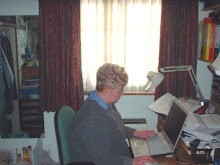I just matched up the Dictionary of Canadian Biography entry of Michael Willis, minister and prof of theology, to his entry in the 1861 census.
A sentence from the DCB: "The name of his wife is not known."
What did he call her in the 1861 census? "Mrs"
And that was life for a great many women of the middle of the nineteenth century.
Last week I came across Mr Cooney, a blacksmith, whose household list of inhabitants started with himself, proceeded to a female servant and her two children, and then to a married Bridget Cooney and two more children bearing the surname Cooney. Hmmm.
I hope they all knew their place.
And that was life for a great many women of the middle of the nineteenth century.
Last week I came across Mr Cooney, a blacksmith, whose household list of inhabitants started with himself, proceeded to a female servant and her two children, and then to a married Bridget Cooney and two more children bearing the surname Cooney. Hmmm.
I hope they all knew their place.




Even late in the 20th century in rural Ontario (and maybe still so), I found women proudly bearing the title of "Mrs. John Smith" rather than any reference to their own personal name, let alone birth surname. Not that I'm a radical feminist, but it's an odd reminder that in some places and cultures (mostly anglo-saxon??) the married female was more than willing to submerge her public identity into male superiority.
ReplyDeleteMy mother's really big hobby was flower arranging. She was good enough at it to become "professional"--teaching evening classes and judging flower shows. Of course, there was publicity in The Star and (back in the day) The Telegram. But who got the publicity? "Mrs" [my father's initials] [family surname]. We talked about using her own given name, but she said she would feel very embarrassed about doing so. When she died, I made sure her own claim to fame was in her death notice.
DeleteI love the young Jane Austen's ironic comment on this, in her *History of England*: "Henry the 4th ascended the throne of England much to his own satisfaction in the year 1399, after having prevailed on his cousin & predecessor Richard the 2d to resign it to him, & to retire for the rest of his Life to Pomfret Castle, where he happened to be murdered. It is to be supposed that Henry was married, since he had certainly four sons, but it is not in my power to inform the Reader who was his wife."
ReplyDelete"Mostly Anglo-Saxon"? I have to wonder. In 18th- and 19th-century Scottish (Presbyterian and Episcopalian) parish records, married women are mostly listed under their maiden or family-of-origin surnames. Likewise with Irish (Catholic) parish records. But from what little I've seen (very little, admittedly) of English (Anglican) parish records, it does look like maternal names were more likely to be ignored/erased in the English church records. Of course, the Scottish Kirk and the Catholic Church in Ireland were hardly feminist institutions! I suspect their inclusion of maiden names, of the names of women's families of origin, had to do with an older understanding of marriage as a union between two families, not just between two individuals?